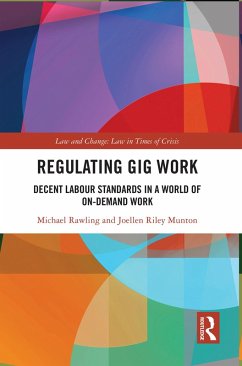
Regulating Gig Work (eBook, ePUB)
Decent Labour Standards in a World of On-demand Work
Versandkostenfrei!
Sofort per Download lieferbar
42,95 €
inkl. MwSt.
Weitere Ausgaben:

PAYBACK Punkte
21 °P sammeln!
Digital revolution demands new approaches to regulating work. The 'Uberisation' of work is not, in reality, a new phenomenon. It reintroduces the practices of 'on-demand' engagement of labour, common prior to the development of continuing employment. What is new, however, is the capacity of digital technology to engage labour in ways that avoid characterisation as employment according to the legal tests developed in the 20th century.This book tackles the challenge of ensuring that the emerging tribes of 'gig' workers in labour markets across the globe are afforded decent standards of work. Thi...
Digital revolution demands new approaches to regulating work. The 'Uberisation' of work is not, in reality, a new phenomenon. It reintroduces the practices of 'on-demand' engagement of labour, common prior to the development of continuing employment. What is new, however, is the capacity of digital technology to engage labour in ways that avoid characterisation as employment according to the legal tests developed in the 20th century.
This book tackles the challenge of ensuring that the emerging tribes of 'gig' workers in labour markets across the globe are afforded decent standards of work. This book discusses how to provide decent conditions and safe working standards for on-demand workers engaged through digital platforms. It interrogates the rise of gig work, and the legal strategies that might be engaged to deal with the risk that on-demand work will fall and remain outside of employment protections. It draws on observations of practices across the globe but focusses particularly on regulatory solutions developed in Australia.
The book will be a useful reference to policy making and legal reforms to address vulnerabilities of gig workers.
This book tackles the challenge of ensuring that the emerging tribes of 'gig' workers in labour markets across the globe are afforded decent standards of work. This book discusses how to provide decent conditions and safe working standards for on-demand workers engaged through digital platforms. It interrogates the rise of gig work, and the legal strategies that might be engaged to deal with the risk that on-demand work will fall and remain outside of employment protections. It draws on observations of practices across the globe but focusses particularly on regulatory solutions developed in Australia.
The book will be a useful reference to policy making and legal reforms to address vulnerabilities of gig workers.
Dieser Download kann aus rechtlichen Gründen nur mit Rechnungsadresse in A, B, BG, CY, CZ, D, DK, EW, E, FIN, F, GR, HR, H, IRL, I, LT, L, LR, M, NL, PL, P, R, S, SLO, SK ausgeliefert werden.













